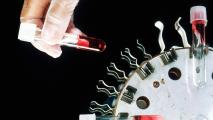The oral antiviral drug EIDD-2801 has emerged as a promising treatment for coronavirus.
Researchers at biotech company Ridgeback Biotherapeutics and DRIVE (a nonprofit based at Emory University) had developed EIDD-2801 as a potential flu treatment when the COVID-19 outbreak began.
Based on what they already knew about the drug — that it showed antiviral activity against other coronaviruses — they quickly decided to pivot their research to the novel coronavirus SARS-CoV-2.
“With EIDD-2801 close to entering clinical trials for influenza and its activity against the SARS and MERS coronaviruses, we immediately recognized that EIDD-2801 had the potential for treating COVID-19,” DRIVE CEO George Painter said in March.
A New Treatment for Coronavirus
With the help of researchers from the University of North Carolina at Chapel Hill and Vanderbilt University Medical Center, the team set out to study EIDD-2801’s efficacy against SARS-CoV-2.
On April 6, they published the results of that study in the journal Science Translational Medicine — and they’re incredibly promising.
“EIDD-2801 holds promise to not only treat COVID-19, but new coronaviruses in the future.”
Timothy Sheahan
When introduced to cultured human lung cells infected with SARS-CoV-2, EIDD-2801 hindered the virus’s ability to replicate itself.
The team also tested the drug’s efficacy in mice infected with two similar coronaviruses: SARS-CoV and MERS-CoV.
When administered 12 or 24 hours after infection, the antiviral reduced the amount of the virus in the animal’s lungs and lessened the degree of their lung damage and weight loss.
When administered prior to infection, EIDD-2801 prevented severe lung damage in the mice.
That suggests that the drug could be useful not only as a treatment for coronavirus, but as an easy-to-administer prophylactic — if an outbreak occurred in a nursing home, for example, the residents could take the antiviral medication as a preventative measure.
Testing the Antiviral in Humans
Now that EIDD-2801 has proven its efficacy as a treatment for coronavirus in the lab, it’s time to see how the drug fares against SARS-CoV-2 in humans.
The same day the team published its paper, Ridgeback Biotherapeutics and DRIVE announced that the U.S. Food and Drug Administration had given them the green light to begin human testing of the antiviral drug.
“FDA’s prompt approval of our (application) allows us to initiate human testing for EIDD-2801 as quickly as possible,” Painter said in a press release. “We are grateful to our collaborators for helping us to assemble this application quickly, and to the FDA for expediting the process.”
The group expects to begin those trials later this spring, and depending on the results, EIDD-2801 might not only provide the world with a much-needed treatment for coronavirus, but other viruses as well.
“With three novel human coronaviruses emerging in the past 20 years, it is likely that we will continue to see more,” Timothy Sheahan, one of the study’s authors, said in a news release. “EIDD-2801 holds promise to not only treat COVID-19 patients today, but to treat new coronaviruses that may emerge in the future.”






